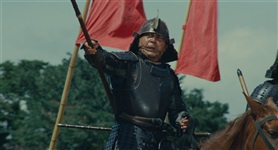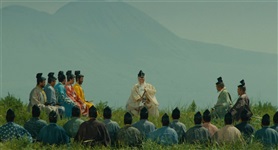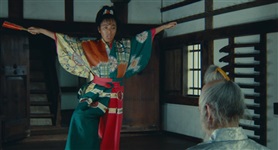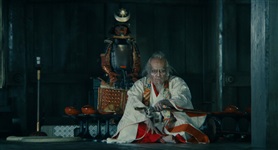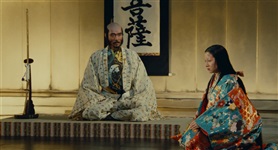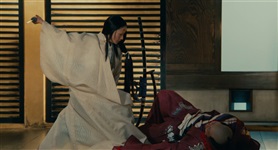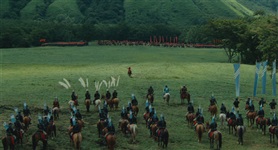Ran (Chaos) (1985)
.jpg)
It's been said that Shakespeare wrote all the best stories (you know practically every Bollywood film ever made is a riff on ROMEO AND JULIET :p), and it's been suggested that Akira Kurosawa directed a lot of the best films... so Kurosawa directing an interpretation of Shakespeare's KING LEAR gives RAN quite an impressive parentage.
Lord Hidetora is the head of the house of Ichimonji, who after 50 years of waging war has conquered all the lands as far as the eye can see. Finally tiring of the carnage, he decides to hand over his dominion to the eldest of his three sons and spend his twilight years chilling out at home with them. His youngest son brands him a senile old fool for handing control to the eldest, and is promptly banished. Hidetora is forced to contemplate whether it's best to listen to those that tell you what you want to hear or what you would rather not, as his kingdom begins to descend into chaos and his mental health follows.
RAN (Chaos) is a very dark film, full of despair at the human condition and the state of society, as loyalty and honour break down to be replaced with greed and vengeance. If we assume that the film is intended to be a comment on the society of 1984 despite the historical setting, it seems that Kurosawa was particularly disillusioned with the state mankind had gotten himself into. Can't argue with that, and I don't think the world has gotten much better since!
The film is a grand epic, staged and filmed in a theatrical manner that fits its Shakespearean roots. The production scale is huge, with amazing sets (I wonder if they had to build those castles themselves before they could burn them down?) and with thousands of extras employed to film the huge battle scenes. The film uses very bold colours throughout, but most strikingly when armies charge at each other and intermingle with their costumes and banners in bright blues, yellows, whites and reds. The logistics of putting together scenes like that are mind boggling, and the results quite awesome.
RAN features rather a lot of violence, some of it most gruesome. Battles feature people getting hacked up and pierced by arrows, with copious amounts of blood staining the ground and corpses lying everywhere. Again, Kurosawa's picture of the world is a bleak one, and mankind's eternal struggle against itself is depicted as if humans are really not so very far removed from the (other) animals... and possibly not in the direction we tend to assume.
RAN was perhaps the culmination of Kurosawa's career, embodying all the things he had learnt through a lifetime in cinema (and often at its leading edge). It's boldly conceived and executed with remarkable technical skill, though the dark theatrics perhaps puts a distance between the film and the viewer, making it less involving and emotive than Seven Samurai. Although Kurosawa was to make a few more movies before his death, RAN feels like he expected it to be his last, his final statement to the world. The last great work of a master.
Cast
Crew
| Director | |
|---|---|
| Writer | |
| Cinematographer | |
| Editor |
